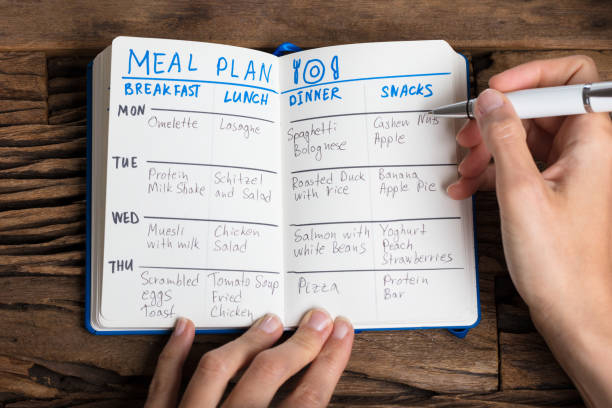
How Do I Create a Food Timetable as a Student in Nigeria?
As a student, setting up a food timetable can greatly benefit you. It simplifies the process of maintaining a balanced diet and eliminates the stress of deciding what to cook or eat. Many students lack a food timetable and simply eat whatever comes to mind, but a structured plan is more effective. A food timetable also helps track your weekly or monthly food expenses. In this guide, I’ll show you How to Create a Food Timetable as a Student in Nigeria that aligns with your dietary needs and budget as a student in Nigeria.
Read Also: 20 Apps to Make Money Online in Nigeria as a Student
How Do I Create a Food Timetable as a Student in Nigeria?
Creating a food timetable as a student in Nigeria helps you stay on track with healthy eating and ensures you receive the nutrients you need. Follow these steps to craft a nutritious and cost-effective food timetable:
- Assess Your Daily Food Needs
Before you start planning your meals, it’s important to understand how many calories your body requires each day to maintain a healthy weight. Use online calculators to determine your daily caloric needs based on your age, weight, height, and activity level.
A calorie measures energy, which your body uses for various functions like breathing, moving, and thinking. It’s crucial to get the right amount of calories to support your body and mind.
- Plan Your Meals for the Week
Once you know your caloric needs, plan your meals for the week. Incorporate a variety of food groups into your meals, including carbohydrates, proteins, vegetables, and fruits, to ensure you get all the essential nutrients.
Meal planning doesn’t have to be elaborate. Opt for simple, enjoyable meals like scrambled eggs, oatmeal, smoothies for breakfast, sandwiches or wraps for lunch, and rice, beans, or vegetables with grilled chicken or fish for dinner.
- Create a Shopping List and Budget
Before heading to the grocery store, make a list of items you need for your meals and snacks. This helps stay organized and avoid buying unnecessary items, saving you money. Stick to your budget by shopping for seasonal produce, which is often cheaper and fresher, and consider buying in bulk for staples like rice, beans, or pasta.
- Prepare Your Meals
Meal prepping can be a lifesaver for busy students. Choose a day to cook your meals for the week, preparing items like rice, beans, and proteins in advance. Store them in airtight containers in the fridge or freezer. Batch cooking, such as making a large pot of soup or stew, can be convenient. Using a slow cooker or instant pot can also save time and effort.
- Store and Preserve Your Food
Proper food storage and preservation help reduce waste and save money. Use airtight containers and label them with the date and contents. Freezing extra portions is useful, especially for soups, stews, and casseroles. This extends the shelf life of your meals and ensures you have food ready to go.
By following these tips, you can create an effective food timetable as a student in Nigeria.
Read Also: 22 Ways to Make Money Online in Nigeria as a Student for Free
Why Should I Have a Food Timetable as a Student in Nigeria?
Here’s why creating a food timetable is essential for students:
- Say Goodbye to Mealtime Stress
Do you often find yourself stressed about what to eat? A food timetable eliminates the daily decision-making process and saves time, especially with a busy student schedule.
- Maintain a Healthy Diet
A balanced diet is crucial for overall health. A food timetable ensures you plan meals that contribute to a healthy diet, helping prevent health issues like obesity and diabetes.
- Save Money
Planning meals in advance helps manage your budget. By making a shopping list and buying groceries in bulk, you can reduce expenses and avoid costly takeout.
- Increase Productivity
A set meal schedule prevents hunger-related distractions, allowing you to stay focused and productive throughout the day.
- Develop Good Time Management Skills
Creating a food timetable requires planning and organization, skills beneficial for other aspects of student life. It helps you manage time effectively and achieve your goals.
Read Also: Where Can I Invest My Money as a Student in Nigeria?
Factors to Consider Before Creating a Food Timetable as a Student in Nigeria
Consider these factors when making your food timetable:
- Dietary Restrictions and Preferences
Account for any dietary restrictions or preferences, such as vegetarianism or food allergies, when planning your meals. Ensure your timetable includes suitable food options.
- Time Constraints
Evaluate your available cooking time. You might need to prepare meals in advance or rely on convenience foods. Batch cooking on weekends can help manage a busy schedule.
- Budget
Determine your weekly or monthly food budget. Plan meals according to local ingredient costs and be creative with your budget to maintain a healthy diet.
- Availability of Ingredients
Consider the availability of ingredients in your area. Adjust your meal plans based on what’s accessible, such as incorporating local seafood or using frozen vegetables if fresh produce is scarce.
- Cooking Skills and Equipment
Assess your cooking skills and available equipment. Start with simple recipes if you’re new to cooking and choose meals that fit your kitchen resources.
How Can I Stick to My Food Timetable as a Student in Nigeria?
Sticking to a food timetable can be challenging, but these tips can help:
- Be Realistic
Set achievable goals based on your schedule and cooking skills. Opt for simple, quick meals on busy days to avoid feeling overwhelmed.
- Meal Prep
Set aside time each week to prepare ingredients or meals in advance. This saves time and makes it easier to adhere to your timetable.
- Shop Smart
Stick to a grocery list to avoid impulse purchases. Shop at local markets or buy in bulk to stay within budget.
- Get Creative
Avoid meal monotony by trying new recipes and experimenting with different ingredients. Repurpose leftovers to create new dishes.
- Find Support
Seek support from friends or family. Share recipes and encourage each other to stick to your meal plan.
- Allow for Flexibility
Be flexible with your timetable. If plans change, adjust without stress and get back on track the next day.
Read Also: What Problems Do University Students Face in Nigeria?
Frequently Asked Questions (FAQ)
What Can I Cook as a Student in Nigeria?
Try Jollof rice, fried rice, beans and plantain, vegetable soup, or egusi soup. For a quick meal, make indomie noodles.
- How Do I Create a Meal Timetable?
Plan your weekly schedule, select recipes, set a budget, and prepare ingredients in advance. Be flexible and make a shopping list.
- What Is a Balanced Meal for Breakfast, Lunch, and Dinner in Nigeria?
For breakfast, consider pap, oats, eggs, bread, or plantains. Lunch might include rice, beans, yam, and soup with veggies. Dinner can be grilled fish or chicken with potatoes, veggies, and rice or yam.
- What Can I Cook on a Low Budget in Nigeria?
Opt for affordable meals like beans and plantain, Jollof rice, or spaghetti with egg sauce. Shop at local markets and buy in bulk to save money.
- How Do I Prepare My Meals for the Week?
Plan your menu, make a grocery list, buy in bulk, and prep ingredients in advance. Cook in batches and store meals in portioned containers.
Conclusion
A food timetable ensures you get the necessary nutrients and manage your diet effectively. Even with rising costs, you can create and stick to a simple food plan. If you have any questions, feel free to leave a comment, and I’ll respond promptly.




